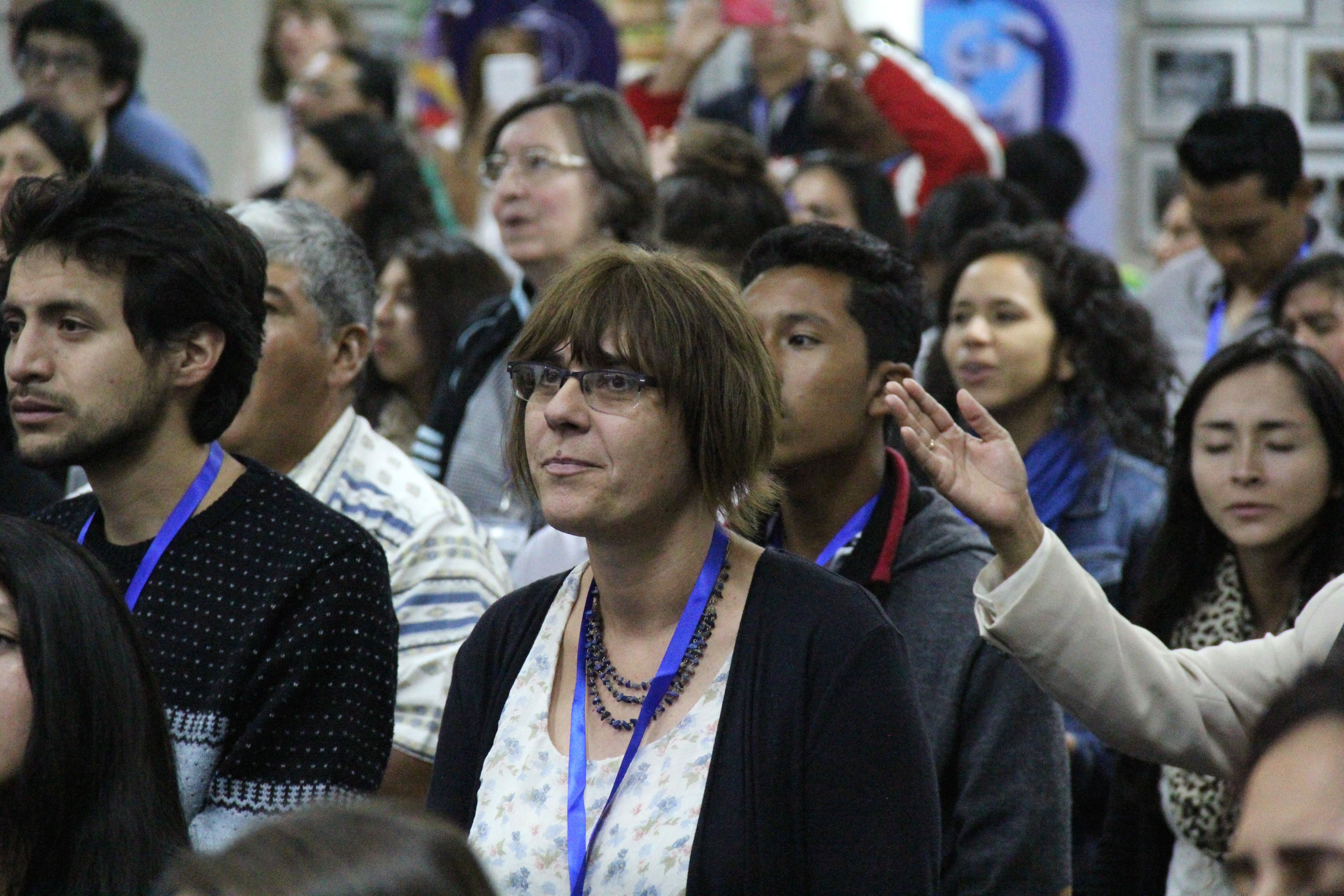Tackling the topic of “Women in Missions” at a conference can be tough. But it paled in comparison to the personal anecdotes of Reach Beyond Global Hands Coordinator Sheila Leech. Talking to some 300 conferees in Quito, Ecuador, she recounted events just a short year apart. By experience however, the events displayed a broad gamut for women in missions.
Her message implored those gathered to share the love of Christ with Muslim women—nearly a billion of them worldwide, Leech estimated. Since 2005, she has become personally acquainted with many while tending to their injuries and illnesses and hearing their stories.
Leech told her own saga of managing personnel and logistics, and then leading an Ecuador-based medical team to meet the needs of earthquake victims in Pakistan in late 2005. In the Islamabad airport, they entered the immigration room to be summoned with, “‘Gentlemen, come, sit down’ as the men were invited to sit, while immigration paperwork was processed.”
Meanwhile, Leech continued, “we women waited in a corner—our heads inclined and covered—as if we did not exist. . . my first visit to an Islamic republic.” Herself a nurse, Leech traveled with female companions, both of whom are physicians.
“I realized that there are many advantages to being a woman in missions, but sometimes there are disadvantages too,” she said adding, “Don’t be discouraged.”
Leech’s admonition to encouragement finds support in research. Latin American families who have left their home countries to minister in cross-cultural settings demonstrated to Dr. Carlos Pinto that “the woman-wife-mother is the one who adapts more easily to the new culture, as opposed to the man-husband-father.” Pinto, a missionary psychologist, serves in Ecuador with Reach Beyond. A consultant in member care, he teaches on this topic with the Latin America-based mission alliance, COMIBAM International.
“The woman is the one who ends up assuming a leading role in the process of facilitating healthy cultural adaptation, due to her ability to be more flexible, socially outgoing, prone to risk-taking, and her more humble ability to assume the role as learner of a new lifestyle,” wrote Pinto. His article The Latin America Missionary Family: Challenges and Blessings appeared in the October 2017 edition of the online journal, Evangelical Missions Quarterly https://www.emqonline.com/node/3699. He cited the males researched as tending to be “more rigid and proud, and to look for spaces [roles] of power instead of service.”
Leech’s health care team—once on the ground in Pakistan’s quake zone—were afforded ample military escort to remote areas where they filled gaps left by some 1,000 quake-ruined hospitals. She found the soldiers cordial and accommodating, while the villagers treated for injuries were shy toward outsiders yet warm and appreciative.
As the evangelical mission agency’s disaster response medical outreach ramped up in the months afterwards, Leech received in 2006 a request to form another medical team—this time to go to Lebanon. An entirely different scenario unfolded early on as the Lebanon ministry partner’s specifics were spelled out. Their need was for health care specialists who were not from the United States and not male. A woman would lead; women would follow, and on this trip, the men would stay behind in Ecuador.
The six person group—five from Ecuador and one from England—found serious medical and spiritual needs in Lebanon while there for two weeks to help alleviate the widespread suffering. As they treated physical ailments, they met people who had lost family members in the war and patients who had suffered hearing loss due to the bombs dropped. Others had seen their homes damaged or destroyed. With local health centers deserted or destroyed, people had no access to medical care. During their short time in Lebanon, the team tended to the needs of some 500 people.

At the Quito conference, Leech invited the crowd to consider God’s use of women to influence the societies and times in which they lived. She mentioned Old Testament references to Ruth—a widowed woman grieving loss, but exercising boldness and faith which elicited response from a kinsman who rescued her from a desperate future—and Deborah, a national leader in a male-dominated society. She also included a New Testament reference to a Samaritan woman who boldly conversed with Jesus and acknowledged him as Messiah.
Leech settled however, on the Old Testament account of a Jewish woman, Esther, and gave the story details. Young and beautiful, she was summoned by authorities to compete in a contest to select the next queen (the earlier queen had spurned her husband, offending him.) Leading up to the contest was a preparatory period, which Leech described as a “spa—six months of this type of treatment and six months of another—a year to bring out the beauty of these women.” As contest winner and queen, Esther used her influence to win a reversal of a genocide decree against her people.
A Latin American woman’s influence may not serve as narrative to in an epic drama, but her influence may be felt in smaller circles, such as a family, a church or a neighborhood. According to Pinto, references to “the weaker sex” do not describe reality. “In moment of crisis,” the psychologist wrote, “the Latin female demonstrates more capacity for the resilience needed to overcome the conflicts that families face in their different stages. For this reason, Latin American colloquial expression states, ‘The man is the head and the woman is the neck that turns the head.’”
“Who is going to reach Muslim women. . . because they cannot speak with men [other than their husbands]?” Leech asked her listeners in Quito. “We women are the ones—especially in Islamic countries—who are going to take the gospel to other women.”
